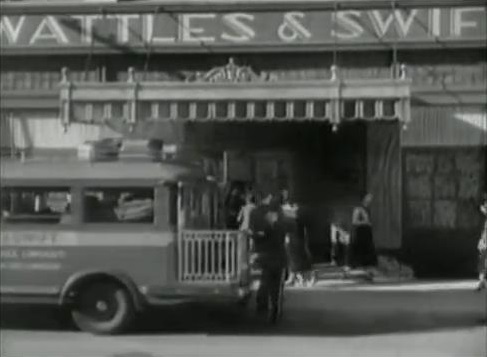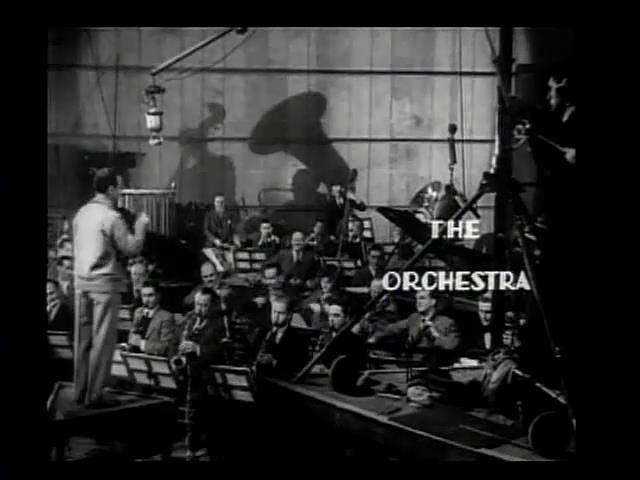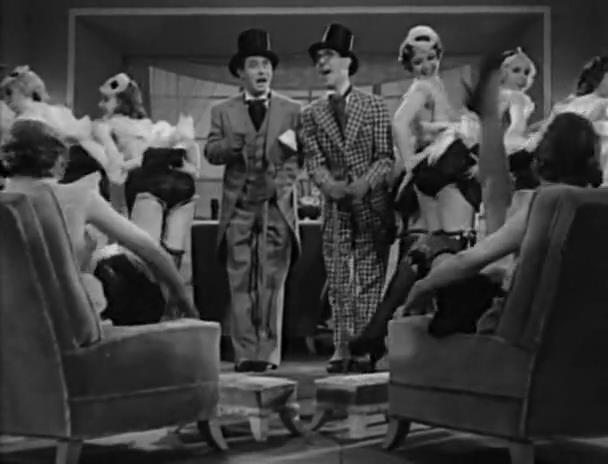Peach-O-Reno

You’ll find
it between Ogden and San Francisco.
“Well, you
see, times are tough. Instead o’ getting new wives this year, most men
are having the old ones overhauled and repainted.”
Wattles &
Swift, legal emporium doing land office business with motor coach service from
the railroad station, they give you a number...
“Nowadays,
Mr. Bruno, everything has changed. Even at a wedding no-one gives the bride
away.”
“No-one
gives the bride away?”
“No. They
keep their mouth shut.”
The author is Tim
Whelan, director of The Divorce of Lady X.
“I could
never pass for a woman, I don’t look masculine enough.”
It’s where The Misfits (dir. John Huston) begins,
and that’s not all, the convertible offices are a feature of Robin and the 7 Hoods (dir. Gordon
Douglas), complete with Wattles & Swift 10 Alimony Jumpers jazz band. “Unh
unh unh, now, mustn’t
speak rudely o’ my joint!”
Ahead of Some Like It Hot
(dir. Billy Wilder), “know him,
I sleep with him!” Still more, ahead of Charley’s Aunt (dir. Archie Mayo), “ain’t I
grounds enough?”
“Joe, you’re
a whole coffeepot, and a saucerful besides.” Two
or three famous English witticisms take Arthur Askey in stride to boot (dir.
Walter Forde). “Whaddya
want me to do, big-hearted?”
The
dance team of Wheeler and Woolsey.
“I promised the folks that we would render them a number.”
“Render? Why,
we’ll tear it apart” (cp. Airplane!, dirs. Jerry Zucker, Jim
Abrahams, David Zucker). “You’ve changed since I saw you last.“
“Oh, thank
you.“
“What’s wrong with ya?“
“Mayb-maybe it’s the heat.”
“Oh, it isn’t
the heat, it’s the stewpiditea.”
“I smell punk.”
“Well, go over
and stand by the window, nobody’ll notice it.”
As in The Blue Dahlia
(dir. George Marshall) and Thieves’
Highway (dir. Jules Dassin), a cop who minds the parking amid murder and mayhem.
|
Now once when a preacher tied a knot a couple could not get free, although a knot is still a knot, it’s not what it used to be. Oh, oh, from Niagara Falls to Reno used to be far away, Niagara Falls to Reno is only a step today. |
Radio
announcer in the courtroom, “Mr. Wattles is wearing a high hat
herringbone two pants suit, and Mr. Swift’s clothes are getting louder and
funnier.”
“And
remember, folks, this entertainment comes to you through the courtesy of the International
Hammer Handle works, Julius Jennifer Swift speaking, station GIN, the breath of
Reno.”
Leonard Maltin, “typical Wheeler and Woolsey vehicle.”
Hal Erickson (All Movie Guide), “one
of the best”. Halliwell’s
Film Guide, “thin stuff,” citing Variety, “for the minor spots.”
Girl Crazy

The show arranged
for cinema by Herman J. Mankiewicz (screenplay Tim Whelan), “additional
new music” George Gershwin.
Custerville, Ariz. for the ailment in the title. The director of Borderline has the journey out West from Chicago by taxicab.
The Arizona
Heavy, just ahead of Buck Benny Rides
Again (dir. Mark Sandrich), “why, the
West—is like my mother, we love every cactus bush that blooms on the
proud bosom of her sweeping plains, and every sun-kissed peak of her
everlasting hills.”
To which the
Gambler, “I gotta buy that record.”
The
Gershwin genius (Max Steiner musical director). “For a minute I thought you were a real Indian!”
The New York
Villain, strictly from San Luz.
“Can’t
you two arbitrate this case?” The Sister’s
imitations, “But Not for Me”. An original
of the Alaskan Polar Bear Heater, the Arizona Snake Charmer.
The Taxi Driver,
sheriff of Custerville by a vote of 800 to 1. “How did that one get in
there?”
“I dunno, but I’ve demanded a recount.”
Mordaunt Hall of the New York Times, “fun of the boisterous kind abounds... the melodious side of this adventure is unimportant... a brand of humor that few could resist.” Leonard Maltin, “it’s not bad.” Craig Butler (All Movie Guide), “amusing and sometimes riotously funny.” Hal Erickson (Rovi), “very funny throughout”. Halliwell’s Film Guide, “weak vehicle”, citing Variety, “too silly.”
Diplomaniacs

On behalf of the
Indian Nation, oil-rich and bewhiskered neither on the right nor on the left,
two reservation barbers strictly from starvation accept a million dollars to
sue for peace in Geneva, failing which a female gorilla awaits them.
There is a
memorable halt in Paris, “On the Boulevard”.
Joseph L.
Mankiewicz devised this entertainment, the stock of arms manufacturers is
dipping, one of them goes after the emissaries.
Louis Calhern even before Duck
Soup (dir. Leo McCarey), Hugh Herbert a Chinaman full of witty sayings such
as this,
|
FIFI:
Let’s all neck. DOLORES:
Yeah! WINKELREID:
This is no time for sex. FIFI:
That’s what you say. WINKELREID:
Ye-es. CHOW
CHOW: Well, it’s sex of one and half a dozen
of another. |
and Wheeler whose “Annie Laurie” is a
thing of tears and gobbets, and Woolsey who sleeps with a lighted cigar.
M.H.
of the New York Times, “insane
affair.” Leonard Maltin, “genuinely odd but endearing nonsense”.
J.R. Jones (Chicago
Reader), “memorably surreal moments.” Halliwell’s Film Guide,
“fatuous”, citing Variety,
“a baddie.”
The
Oxford-educated Chief is a genuinely endearing joke, later (“The Night of
the Double-Edged Knife”, The Wild Wild West, dir. Don Taylor) it’s Princeton, or
rather Dartmouth.
“‘We
promise not to make no more war on nobody at no
time.’”
“Uh-huh.”
“‘Yours
truly, England, France, Germany, Russia, Spain, Abyssinia—’”
“A’ be seein’ you sometime,
too.”
“‘—Italy and et cetera.’”
“Et
cetera? Where’s
that?”
“At the end
of a sentence, I always see it there.”
“Well, et
cetera will have to sign it too.”
Just before the
finale is the birthplace of Dozier’s Batman
and Brooks & Henry’s Get Smart.
“Hey! Where’s your cigar?”
“She
swallowed it.”
It’s De Lawd’s Prayer
at the Peace Conference chaired by Edgar Kennedy, then back to Hoklamona with the goods, a cruel forgery. DIPLOMANIACS
BLAMED FOR WORLD WAR, says The Evening
News, “GET DIPLOMANIACS!” CRY PUBLIC, the Evening Dispatch-Gazette.
War,
with a chorus in Heaven.
Sons of the Desert
There’s
nothing better than Leo McCarey’s raw and striking treatment of We Faw Down except Seiter’s illumination of it in
six reels. He has a gag here later borrowed by Richard Lester, the duplex
shared by Laurel and Hardy that Mr. Laurel mysteriously traverses, entering at
one door to open the other. The direction is pitched just slightly higher, so
that long and complex gags like the washtub sequence not only show the
unutterable precision of the cast, but how effortlessly the style is managed,
and something more. When Mrs. Hardy stumbles backward into her husband’s
footbath, Mr. Laurel is leaning over it and she plunks down into the water
sitting on the back of his head, so that Stanley is face down underwater, and
when he’s finally extricated he comes up with a soggy ice bag in his
mouth, an example of pure clowning harking back to his auguste
days.
The plot has all
the members of their lodge sworn by the Exhausted Ruler, as Stanley calls him,
to a mission of great urgency, a convention of the order in Chicago. Their
wives rule the roost so completely, Mrs. Hardy at the point of a kitchen knife,
and duck-hunting Mrs. Laurel with a shotgun, that the husbands are reduced at
one point to hiding in the attic.
They go to
Chicago on the pretext of Ollie’s “nervous shakedown”
necessitating a rest cure in Honolulu, but the ship sinks on their supposed
return passage, with loss of life and a panicked search for survivors. And
there they are, grinning at the newsreel camera in Chicago, where they meet
another Son of the Desert (Charley Chase) who greets newcomers by placing a
wallet on the floor and thwacking their bottoms with a
slapstick. He calls his sister in Los Angeles and puts Ollie on the
phone, whose voice is recognized by Mrs. Hardy.
The pure hilarity
of it all is expressed by Ollie guffawing mightily over a conventioneer’s
silly jest. The entertainment in Chicago is a line of dancing girls wearing
Hawaiian outfits, so that, like Huysman’s Des Esseintes, they’ve had their fun without the
inconvenience of a sea voyage, as Mr. Hardy justly observes.
Roberta
The film has been
analyzed to some extent by other directors, and there is a direct line through
Lubitsch’s Ninotchka and Chaplin’s A Countess from Hong
Kong, the essential work is Ritt’s Paris Blues (Kelly &
Donen ape the French lesson for Singin’
in the Rain, the two bouncers at the Café Russe
occur in Kelly’s Invitation to the Dance).
The height of French
fashion is Aunt Minnie, known as Roberta, whose fashion house is run by a
Russian princess in exile (the doorman is a prince). The American nephew, a
halfback, inherits.
Huck Haines and
His Wabash Indianians ought to have feathers on, Countess Scharwenka is Lizzie Gatz, the girl next door.
The surrealistic
construction seems to have defeated even Broadway critics, and down to the
present day.
The
halfback’s girl is a snob from back home.
The numbers are
generally accorded as masterful.
Room Service
“A Pharaoh
who knew not Joseph” tries to throw a theatrical troupe out of the White
Way Hotel, queers the deal with a backer, and is about to shut down opening
night when the vision is revealed to him, the sick and dying playwright emerges
from the suicidal grave in evening dress, another suicide in the cast is one
who died toiling in the mines of the play, carried out to a curtain call.
The Oswegian author, only four hours and forty-five minutes
from Broadway, calls his play Hail and Farewell, an even better title
than the original Godspeed.
Time Out Film
Guide thinks this is dull, why, it even has Chico spouting Latin! What Binelli says beside the playwright’s hotel deathbed
is “e pluribus unum”.
Seiter’s
nonpareil direction is just the thing.
Destroyer
There’s them as builds her, and them as sails her, and a helluva lot of salt water in between, as a rule.
The old man goes
aboard as chief, in this instance.
Dutch Harbor is
the first port o’ call (cf. Huston’s Report from the
Aleutians).
A
very brilliant film on the provenance of a Navy ship bearing the name of the
skipper of the Bonhomme Richard.
“A leaky
and top-heavy vessel”, said Bosley Crowther of
the New York Times.
“Flat
propaganda piece,” says Halliwell’s Film Guide, “not
too well made.”
Borderline
The first two
shots after the credits and their stirring theme set the position Seiter is in, a tall exterior of a Federal building,
dissolving to a pile of dope packets on an agent’s desk. The ennui of the
dope trade informs the whole picture, and Seiter
expands on this to develop a very spacious comedy that is full of quirks and
surprises. It belongs with Huston and Peckinpah, but it’s distinctly
original, even in the type of comedy it manages. And at the same time,
it’s a film noir that sustains a few hijinks
and then breaks out in To Have and Have
Not gunplay. It’s that sort of film.
In fact, to
discuss all the structural implications of the title would, even after fifty
years, give away the charming recognition of the ending. The great centerpiece,
however, demands praise.
The two American
G-Men (a G-Man and a G-Woman), who are both undercover and carrying a load of
drugs up from Mexico, and who don’t know each other, are escaping from a
rival gang, who ambush them by placing a mule cart full of straw to block the
road. The G-Woman lights the straw on fire, and they’re back on the
highway. Unfortunately, the G-Man’s escort, Miguel, has caught a bullet
and expired on the back seat of the convertible. A motorcycle cop observes them
speeding, and gives chase. Now, as the G-Man comments, is a fine time to have a
cop on your tail, with a load of dope and a dead man (staring and bouncing) in
your car.
The G-Man tells
the cop Miguel is sick, and the cop gives them an escort into town, where they
lose him long enough to trade the body of Miguel for a drunk in a doorway. They
rejoin the cop, re-explain the situation (now he’s a sick man they picked
up on the highway), and when the cop (now joined by others) lifts the hat
covering the unfortunate man’s face, he rises singing a song about “mas cerveza”. The scene ends with an
inexpressibly comic gesture from one of the other cops.